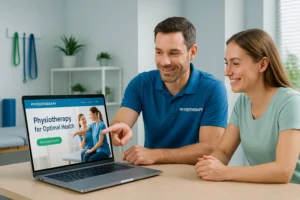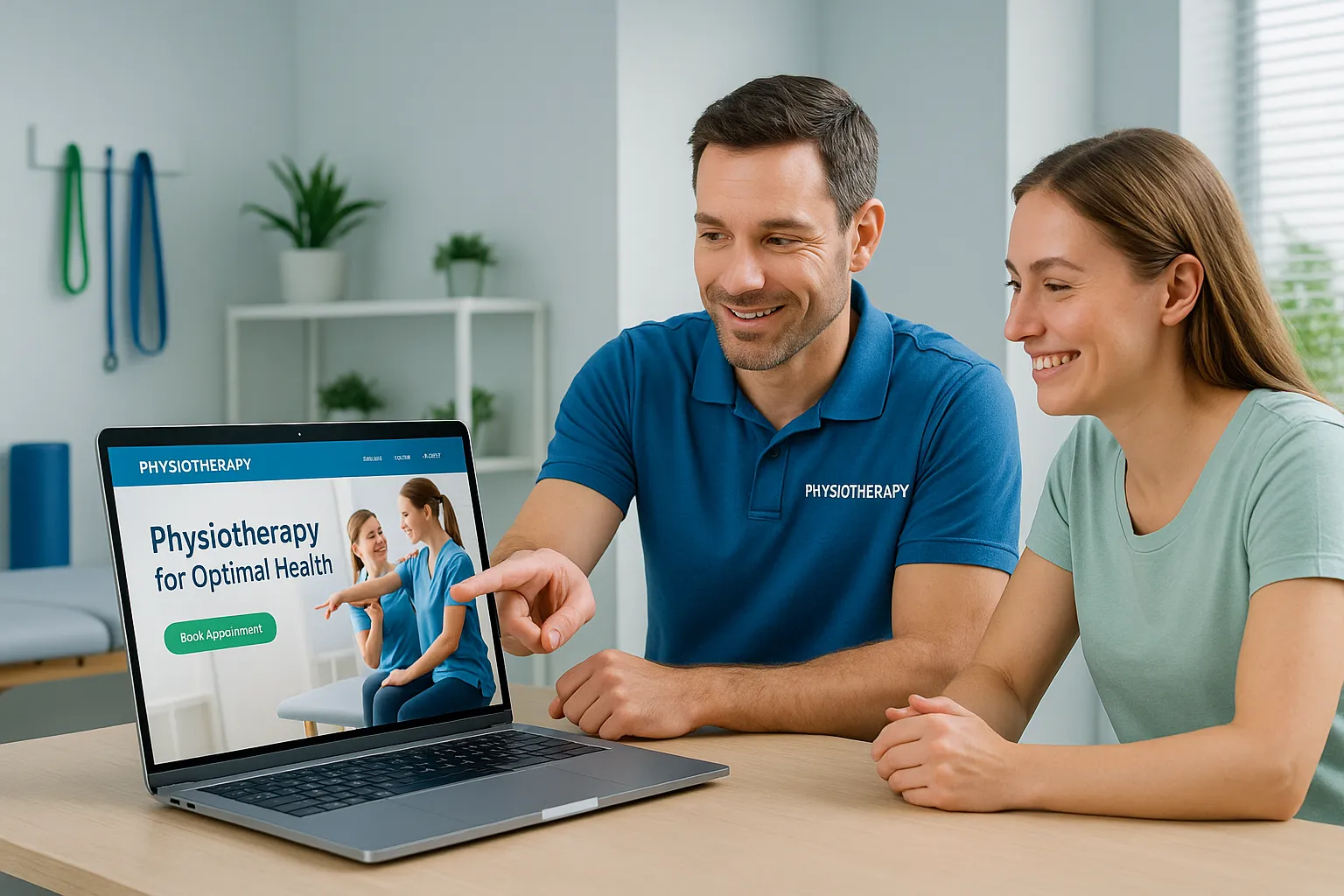Four ways to make your physiotherapy website your best asset, beyond the brochure
- July 23, 2025
Your main job as a dedicated physiotherapist is to give your patients the best care possible. You have spent years improving your clinical skills, specializing in certain areas, and learning techniques that really make a difference in people’s lives. However, does your website, serving as your digital front door, truly reflect that level of expertise?
For many private practices, their website is just a digital brochure with a list of services, an address, and a phone number. This method works, but it doesn’t really show what your practice is all about and misses a big chance. In today’s competitive digital world, having a generic online presence makes it difficult for potential patients to see what makes you special.
Your website shouldn’t just sit there; it should be your hardest-working employee, building trust, bringing in your ideal patients, and making you the go-to expert in your field. This is very important if you work in a specific field, like cancer rehabilitation, pelvic health, or sports performance.
Here’s how to turn your physiotherapy website from a simple online listing into a powerful tool for growing your practice.
1. Define and take over your clinical niche.
Not having a clear focus is the most common mistake on a physiotherapy website. Attempting to cater to everyone’s needs often results in your website losing its appeal. If someone seeking your services immediately discovers your site, they should immediately recognize that they have come to the correct place.
The Plan: Put your area of expertise front and center on your website instead of hiding it on an internal service page. Whether you’re a certified concussion management therapist or an expert in cancer rehabilitation, your unique value proposition should be prominently displayed on your website.
Homepage clarity: Your homepage headline should quickly show who you help and how. Instead of “Physiotherapy Services,” a better headline would be “Expert Cancer Rehabilitation to Help You Get Your Strength and Confidence Back.”
Tell Your Story: Make a strong story on your “About Us” page. We would appreciate it if you could share the reasons behind your choice of study area. This personal connection creates an immediate level of trust and shows your passion, which patients looking for specialized care really appreciate.
Detailed Service Pages: Make separate, detailed pages for each of your main services. A page about “Lymphedema Management” or “Return-to-Sport ACL Rehabilitation” will not only help patients, but it will also do much better in search engine results for those terms.
2. Build Authority by Providing High-Value Educational Content
When a patient finds out that you offer the service they need, the next thing they want to know is, “Can I trust this person with my health?” Sharing your knowledge freely is the best way to build trust online.
The goal is to establish yourself as a reliable resource by creating content that educates, empowers, and addresses the questions your patients frequently search for on Google.
Strategic Blogging: For healthcare, a regular blog is the most important part of content marketing. Write articles that answer common questions from patients, explain complicated conditions, or give useful advice. Topics like “5 Safe Exercises to Combat Chemo-Related Fatigue” or “Navigating ‘Chemo Brain’: How Physiotherapy Can Help” are very helpful for a physiotherapy website that focuses on cancer. This method not only builds trust, but it is also an important part of a strong healthcare SEO strategy.
All the answers to your questions: Please prepare for patient inquiries and address them comprehensively in a detailed FAQ section. This shows that you are open and caring and that you understand their worries. It also helps you get more “long-tail” keyword searches, which makes you even more visible online.
3. Use Social Proof: Let Your
Results Speak for Themselves
It’s more effective when your patients praise you than when you do. Testimonials, reviews, and case studies are all forms of social proof that show you can trust someone.
The Plan: Include patient success stories on every page of your website to show how you are making a difference.
Don’t put all of your best reviews on one page. Put strong, quote-based reviews on your homepage, service pages, and close to “book now” buttons. Adding a patient’s first name and condition (with their permission) makes it more real.
In-Depth Case Studies: Make anonymous case studies for a more in-depth look. Please describe the patient’s initial issue, the treatment provided, and the positive outcome achieved. This way of telling stories lets potential patients picture themselves on the road to recovery and gives them a lot of faith in your ability to help them.
4. Make sure that the patient experience is smooth and easy.
Your clinical knowledge may be world-class, but if your website is hard to use, slow, or makes it hard to make an appointment, you will lose potential patients. If users have a negative experience, all your efforts to establish trust and authority may be in vain.
The Plan: Look at your website as if you were a new patient. It should be easy, quick, and obvious for people to go from your website to booking an appointment.
Design for mobile first: Most of your patients will find you on their phones. Make sure your site works on all devices, loads quickly on mobile, and is easy to use with just your thumb.
Clear Calls to Action (CTAs): On every page, use buttons that are easy to understand and make people want to click on them, like “Book Your Appointment,” “Schedule a Free Consultation,” or “Download Your Guide.” Don’t make visitors look for the next step.
Easier to Get in Touch and Make Reservations: Give people several ways to get in touch, such as a simple contact form, a phone number that is straightforward to find, and, if possible, an online booking system that is built in. The easier it is for people to get in touch, the more likely they are to make a purchase.
You can turn your physiotherapy website from a passive digital brochure into your best tool for getting patients to come in and grow your business by changing your way of thinking and using these tips. It’s time to make your online presence as professional, specialized, and helpful as the care you give every day.
Website Care vs. One-Time Website Build: Which Do Smart Physio Clinics Choose?
Discover why physiotherapy clinics choosing ongoing website care outpace those...
Read MoreThe Ultimate Guide to Digital Marketing and Website Management for Physiotherapists
Discover 5 essential tips to create an amazing physiotherapy website...
Read MoreFour ways to make your physiotherapy website your best asset, beyond the brochure
Discover 5 essential tips to create an amazing physiotherapy website...
Read MoreHow to Highlight Your Expertise as a Cancer Rehabilitation Expert Online
Discover 5 essential tips to create an amazing physiotherapy website...
Read MoreSpecializing in cancer rehabilitation allows physiotherapists to provide targeted care for patients recovering from cancer and its treatments. This expertise ensures that patients receive evidence-based, safe, and compassionate support throughout their recovery journey, which can greatly improve their quality of life.
Focus on creating dedicated sections that showcase your credentials, case studies, and patient testimonials related to cancer rehab. Regularly update your blog with informative articles, use clear and compassionate language, and optimize your content with relevant keywords to increase your visibility in search results.
Include detailed descriptions of your services, your specific experience with oncology patients, educational resources, success stories, and clear calls-to-action. Sharing knowledge through articles and answering common patient questions also helps establish your authority while building trust online.
Effective SEO ensures that when patients search online for “cancer rehabilitation expert” or related terms, your website appears near the top of the results. This makes it easier for patients seeking specialized care to find you and learn about your services.
Patient testimonials provide authentic, relatable proof of your skills and compassion. They help reassure potential patients and demonstrate real-world outcomes, making your expertise and approach more credible and inviting.

Website and Digital Marketing Solutions for Physiotherapists and Cancer Rehabilitation Physiotherapists
Contact Us
- info@physiowebcare.com
- I work from beaches and hills!
- Skype me for a call
Get Connected














